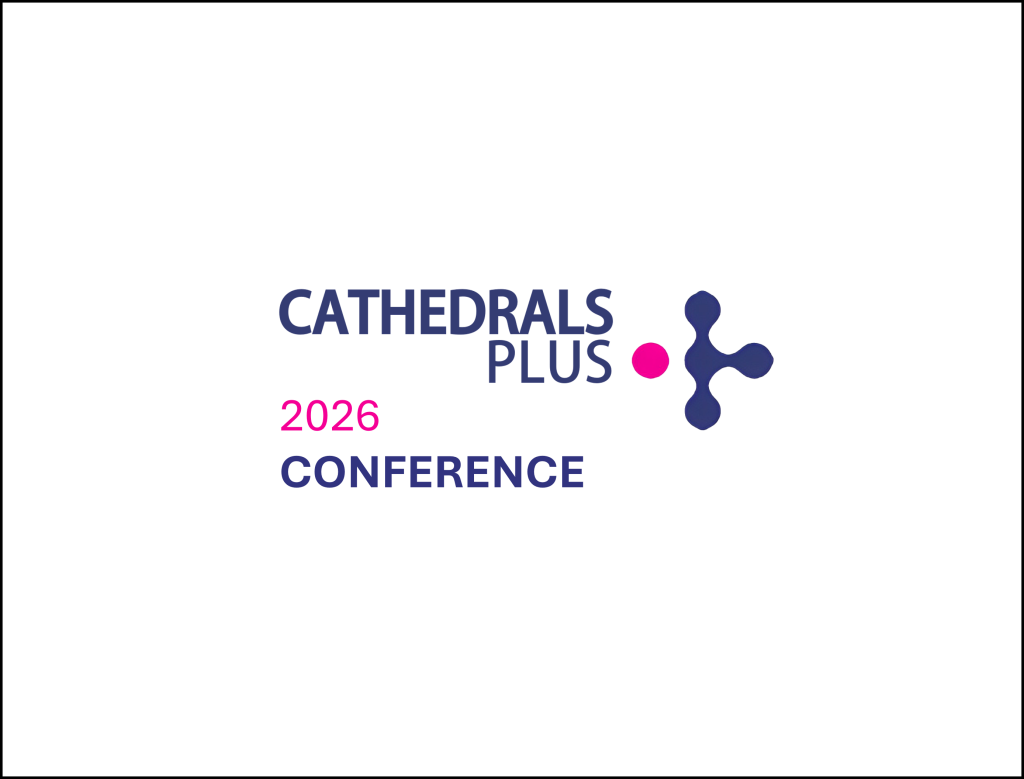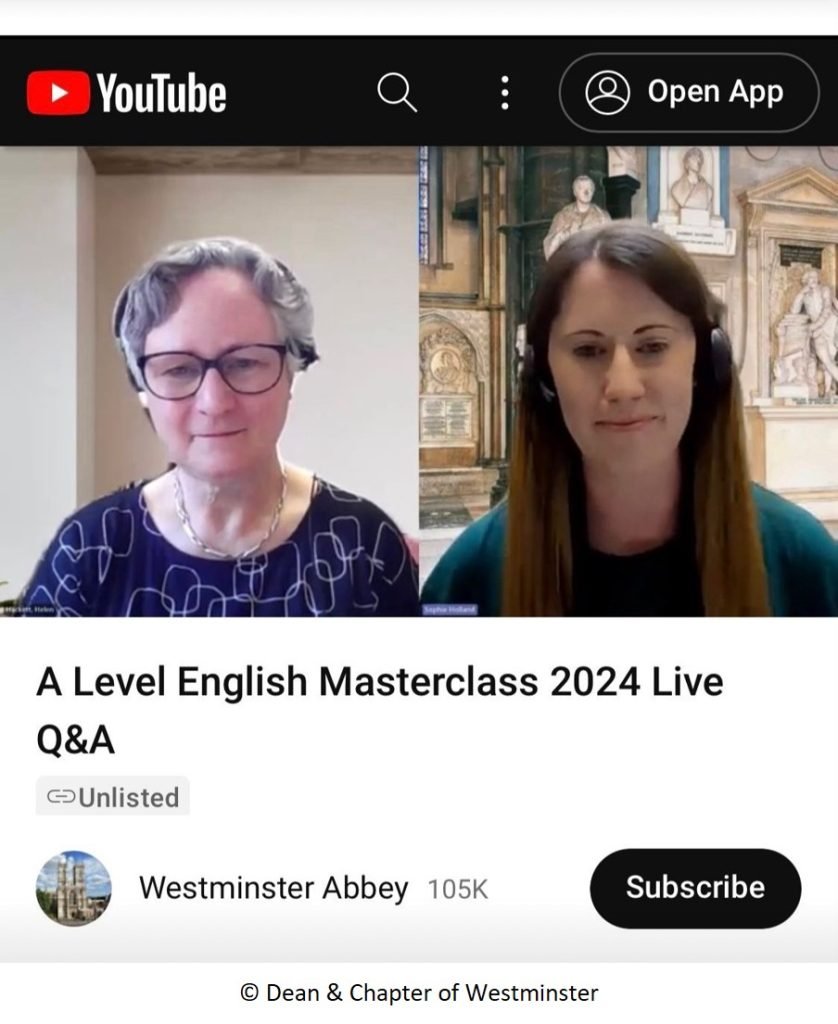Featuring reflections, stories and news from our members across the UK on Heritage, Faith, Pilgrimage & Welcome, Community, Experience, History & Awe!
Become part of the Cathedrals Plus community… comment and like our posts and engage in dialogue with our readers and members. Welcome and enjoy!
- Annual Conference January 2026 in DUBLIN – bookings now open!

Come and join us for our annual residential conference in Dublin in January 2026! We have opened the bookings earlier than usual this time so that you can explore the possibilities of advance (and therefore possibly cheaper!?) fares to travel to Dublin.
Our theme is: INSPIRING LIVES: People of Faith at the Heart of the Community
We have some wonderful speakers lined up, some excellent workshops and some exciting tours and activities for delegates to enjoy. We are extremely grateful to the teams at Christ Church Cathedral, Dublin and at Saint Patrick’s Cathedral, Dublin who are hosting us jointly and who have been working hard already to offer a truly warm welcome for us. We are working together to finalise the programme, and will publish the list of our keynote speaker(s) and guests shortly.

The conference will begin on Tuesday 13th January 2026 with arrivals from 12.30pm for lunch. Sessions begin at 2pm and will run through the afternoon, with a supper & social in the evening after check-in at your hotel. There is a full day of activities planned for Wednesday and a Conference Dinner in the evening. We will finish on Thursday 15th January at approximately 1.15pm with the distribution of a packed lunch for you to enjoy on your journey home or to take with you whilst exploring the sights and treasures of Dublin in your own time.
The conference is designed for people working (or volunteering) with responsibility for visitor engagement or for education and learning in cathedrals, abbeys, minsters, shrines or other sacred spaces in the UK, Northern Ireland, the Republic of Ireland or indeed globally. You do not have to be working in a member organisation to attend, although our members benefit from a discounted rate for delegates. Rates are as follows:
MEMBER (full board) £385
NON-MEMBER (full board) £435
* An Earlybird discount of £25 is offered to MEMBERS ONLY who book BEFORE 30th JULY 2025. (£360)
These rates include:
– 2 nights accommodation at our partner hotel (a few minutes walk from both cathedrals in Dublin)
– full board – all meals and refreshments from lunch on Tuesday to lunch on Thursday (inclusive)
– attending conference events – workshops, speaker sessions, tours, socials
– delegate bag with items relating to the conference theme – printed materials, resources from delegate’s cathedrals/sacred spaces, gifts donated by our partners/sponsors etc.A day rate is also available on request.
Here is the link to the booking form.
We encourage all cathedrals, abbeys, minsters, shrines, major churches and sacred spaces to consider joining us. If you welcome school visits, organise and host events for visitors, tourists or pilgrims, and/or want to develop your ministry of welcome, come along to our annual conference and experience all we have to offer in support of your role and your mission. We are ecumenical, international, and welcoming! Click here for more about the benefits of Cathedrals Plus membership and here for more about previous conferences.
If you are a cathedral in Northern Ireland or the Republic of Ireland and would like to attend, please contact our Secretary for details of a new membership offer. Email secretary@cathedralsplus.org.uk
If you have any queries about booking to attend the conference, email sarah.page@cathedralsplus.org.uk
We look forward to seeing you in January 2026!
- A-level English Masterclass at Westminster Abbey

Today’s blog is written by our guest blogger, Sophie Holland from Westminster Abbey.
Since 2019, the Learning team at Westminster Abbey have run an annual A-level Masterclass. These sessions give students the opportunity to engage with an academic in a subject they’re studying and include a specially created lecture, as well as a Q&A where students submit their own questions to the speaker. The first Masterclass sessions took place at the Abbey, but since 2021 it’s been an online offer, making it accessible to a wider audience.
The aim of the Masterclass is to provide a taster of university for students but also to be an enrichment opportunity for their current studies. Previous Masterclasses have focused on RE and History, with topics including ‘Does science need God?’ with Brother Guy Consolmagno SJ and ‘Elizabeth I and Mary, Queen of Scots’ with John Guy.

We’re fortunate that the Abbey has strong links to many curriculum subjects, including Poets’ Corner, where more than 100 poets and writers are buried and remembered. In 2024 we ran our first English Masterclass in collaboration with Helen Hackett, Professor of English Literature at UCL. Based on her research interests, Helen was keen to explore female writers which felt like a perfect topic for our next Masterclass, and a great topic to tie into Women’s History Month in March. This became ‘Shakespeare’s Sisters: Early Women Writers in Westminster Abbey’
Masterclass was promoted in three marketing pushes on social media, via our schools’ newsletter and through direct contacts. Despite being a busy time in the academic year, it proved popular, with 159 students and 11 teachers attending from schools and colleges nationally, and even internationally.
One of the strengths of the lecture was how strongly it linked to the Abbey. Helen researched and explored the lives and writings of women buried or remembered here (including Elizabeth I, Aphra Behn and Margaret Cavendish) but also gave context to the location of their memorials. This was influenced by a research visit Helen made to the Abbey, which allowed us to get up close to the memorials and to collaboratively discuss the content of her lecture.
Feedback from teachers confirmed that Masterclass was an enriching experience for their students, which owes a lot to Helen’s passion for the topic. It was brilliant working with an academic who had experience in producing well-structured lectures. However, it was also useful to consider Helen an outside speaker and to provide her with guidance around things like language use, for example, to make sure we were on the same page.

After watching the lecture, students then had the opportunity to submit questions in advance of a live Q&A with Helen. We received 57 questions, which showed they had really engaged with the topic. One benefit of receiving questions in advance was that we could ensure that questions were asked across a range of topics, and from a number of different schools. Helen was also able to do some research in advance, to provide well-thought-out answers.
Overall, an event like Masterclass can be a great way to engage with A-level students, giving them the opportunity to meet an academic, to (hopefully) be inspired by our site and, importantly, to have the chance to ask their own questions in their own voice.
Sophie Holland, Westminster Abbey
- SAVE THE DATE!

We are delighted to announce that our next annual residential conference will be hosted in Dublin, with huge thanks to Christ Church Cathedral and Saint Patrick’s Cathedral who will be hosting us jointly. It is the first time we’ve held a conference outside of the UK for over 25 years, so we are thrilled to receive the Dublin cathedrals’ invitation. We hope you can join us – whether a member of Cathedrals Plus or not – You will be very welcome!
Our theme for 2026 is
INSPIRING LIVES: People of Faith at the Heart of the Community
This year’s theme will examine the role of people of faith in the wider community, encompassing a range of topics including outreach, social justice and bringing people to our sacred spaces.

Booking will open shortly, and we will be publishing our list of speakers as they are confirmed. We will also share the conference programme as it evolves.
Plus, we will soon reveal some great news regarding a successful application for funding towards a new project linked to our conference theme: Inspiring Lives: Saints, Martyrs and Missionaries.
So, SAVE THE DATES!
Booking this far in advance will hopefully enable you to secure cheaper (advanced) fares for your chosen mode of transport to Dublin. The conference fees, conference timetable and booking form will be uploaded to our website very shortly.


No Responses